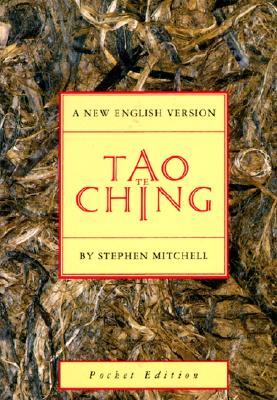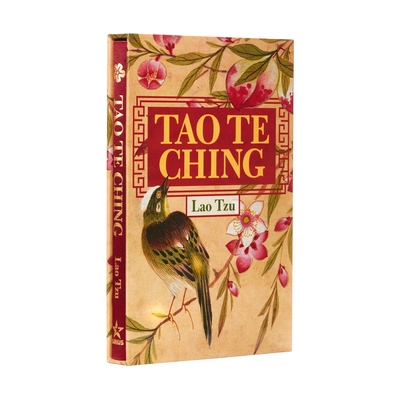




The bestselling, widely acclaimed translation from Stephen Mitchell
Mitchell's rendition of the Tao Te Ching comes as close to being definitive for our time as any I can imagine. It embodies the virtues its translator credits to the Chinese original: a gemlike lucidity that is radiant with humor, grace, largeheartedness, and deep wisdom. -- Huston Smith, author of The Religions of Man
In eighty-one brief chapters, Lao-tzu's Tao Te Ching, or Book of the Way, provides advice that imparts balance and perspective, a serene and generous spirit, and teaches us how to work for the good with the effortless skill that comes from being in accord with the Tao--the basic principle of the universe.

The most accessible and authoritative modern English translation of this esoteric but infinitely practical bestselling book.
No one has done better in conveying Lao Tsu's simple and laconic style of writing, so as to produce an English version almost as suggestive of the many meanings intended. --Alan Watts
For nearly two generations, Gia-fu Feng and Jane English's bestselling translation of the Tao Te Ching has been the standard for those seeking access to the wisdom of Taoist thought. Now Jane English and her long-time editor, Toinette Lippe, have revised and refreshed the translation so that it more faithfully reflects the Classical Chinese in which it was first written, taking into account changes in our own language and eliminating any lingering infelicities. They have retained the simple clarity of the original rendering of a sometimes seemingly obtuse spiritual text, a clarity that has made this version a classic in itself, selling over a million copies.
Written most probably in the sixth century B.C. by Lao Tsu, this esoteric but infintely practical book has been translated into English more frequently than any other work except the Bible. Gia-fu Feng and Jane English's superb translation offers the essence of each word and makes Lao Tsu's teaching immediate and alive. This edition includes an introduction and notes by the well-known writer and scholar of philosophy and comparative religion, Jacob Needleman.


This bold new translation by two brilliant poets offers a contemporary perspective on a timeless masterpiece of Daoist scripture, introducing Dao De Jing to a new audience while retaining the majesty of the Chinese original. Composed of eighty-one short poems written by the sage Laozi in 400 BC, Dao De Jing is one of the pillars of Chinese thought. Acclaimed poet Li-Young Lee and poet and scholar Yun Wang illuminate Dao De Jing as a unified work of art. This revelatory and faithful translation--presented alongside the original Chinese text--reveals its enduring teachings in their profound simplicity, subtlety, and balance.


Place the word Tao
Into your heart.
Use no other words.
The Tao is constantly moving, the path that all life and the whole universe takes. There is nothing that is not part of it--harmonious living is to know and to move with the Tao--it is a way of life, the natural order of things, a force that flows through all life.
365 Tao is a contemporary book of meditations on what it means to be wholly a part of the Taoist way, and thus to be completely in harmony with oneself and the surrounding world.
Deng Ming-Dao is the author of eight books, including The Living I Ching, Chronicles of Tao, Everyday Tao, and Scholar Warrior. His books have been translated into fifteen languages. He studied qigong, philosophy, meditation, and internal martial arts with Taoist master Kwan Saihung for thirteen years, and with two other masters before that.

The basic writings of Chuang Tzu have been savored by Chinese readers for over two thousand years. And Burton Watson's lucid and beautiful translation has been loved by generations of readers.
Chuang Tzu (369?-286? B.C.) was a leading philosopher representing the Taoist strain in Chinese thought. Using parable and anecdote, allegory and paradox, he set forth, in the book that bears his name, the early ideas of what was to become the Taoist school. Central to these is the belief that only by understanding Tao (the Way of Nature) and dwelling in its unity can man achieve true happiness and freedom, in both life and death. Chuang Tzu: Basic Writings includes the seven inner chapters, which form the heart of the book, three of the outer chapters, and one of the miscellaneous chapters. Watson also provides an introduction, placing the philosopher in relation to Chinese history and thought. Witty and imaginative, enriched by brilliant imagery, and making sportive use of both mythological and historical personages (including even Confucius), this timeless classic is sure to appeal to anyone interested in Chinese religion and culture.



'All things end in the Tao just as the small streams and the largest rivers flow through the valleys to the sea.'
The Tao Te Ching came into existence some 2,500 years ago, since when it has become the most influential text of Eastern philosophy. Best translated as The Classic of the Way and its Power (or Virtue), its teachings are of simplicity, humility, and 'non-action', and its cadenced poetry is at once spare and profound. This beautifully illustrated slipcase edition features exquisite Chinese images that bring out the timeless wisdom of the text and it subtle guidance on how to live well.
The brilliant new translation of the classic Taoist guide to meditation that Carl Jung made famous.
'Thomas Cleary's translation is like an island of peace in the troubled sea of today's world. His beautifully lucid translation of the classic Chi

The ancient Taoist text that forms the central part of this book was discovered by Wilhelm, who recognized it as essentially a practical guide to the integration of personality. Foreword and Appendix by Carl Jung; illustrations. Translated by Cary F. Baynes.A Helen and Kurt Wolff Book

Nei Gong has been a well-kept secret within the Daoist sects of China for centuries. Based upon the original teachings of the great sage Laozi, it has only ever been taught to close students of the masters chosen as the heads of the ancient orders.
This book provides a breakdown of the entire Nei Gong process, and explains in plain English the philosophy which underpins Nei Gong practice, and which is based on the original teachings of the ancient Daoist priests. The methodology of Sung breathing, an advanced meditative practice which has until now been reserved for 'inner-door' students is described, and the book contains an entire set of Qigong exercises accompanied by instructional photographs and drawings. This book will be of interest to all practitioners of Qi Gong, martial arts and meditation, and will be a rewarding read for anyone interested in Eastern philosophy.


The Taoist spirit comes to life, made vibrant and contemporary through the Chinese ideograms whose images and stories speak of living in harmony with the Tao. Everyday Tao revives an ancient approach to meditation and reflection by using these stories as sources of insight for spiritual growth.
Tao is a person running along a path
A companion volume to the bestselling 365 Tao, Everyday Tao offers clear, specific directions on bringing the Taoist spirit into our work, our relationships, and other aspects of our everyday lives. Each ideogram provides the starting point for a Taoist lesson. The narrative that follows shows how we can achieve an intimate relationship with nature, others, and our natural selves.
